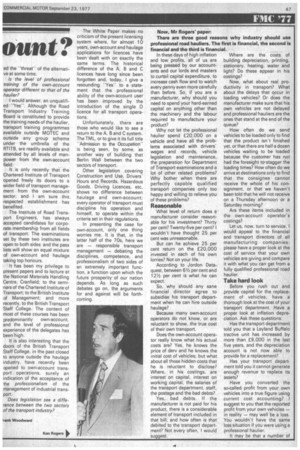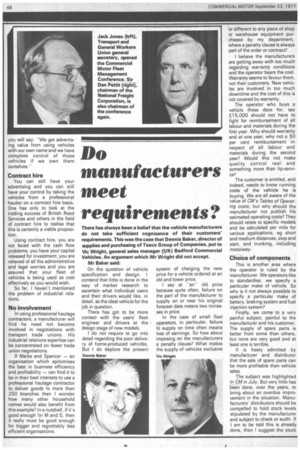Now, Mr Rogers paper: There are three good reasons why
Page 53

Page 54

If you've noticed an error in this article please click here to report it so we can fix it.
industry should use professional road hauliers. The first is financial, the second is financial and the third is financial.
In these days of high inflation and low profits, all of us are being pressed by our accountants and our lords and masters to curtail capital expenditure, to increase cash flow and to watch every penny even more carefully than before. So, if you are a _manufacturer, why should you need to spend your hard-earned capital on anything other than the machinery and the labour required to manufacture your product?
Why not let the professional haulier spend £20,000 on a vehicle and have all the problems associated with drivers' wages and records, vehicle legislation and maintenance, the preparation for Department of Transport examinations and a lot of other related problems? Why bother when there are perfectly capable qualified transport companies only too happy and willing to relieve you of these problems?
Reasonable
What level of return does a manufacturer consider reasonable for his investment? Thirty per cent? Twenty-five per cent? I wouldn't have thought 25 per cent was unreasonable.
But can he achieve 25 per cent return on the £20,000 invested in each of his own lorries? Not on your life.
According to Jordon Dataquest, between 61/2 per cent and 121/2 per cent is what he can expect.
So, why should any sane financial director agree to subsidise his transport department when he can hire outside haulage?
Because many own-account operators do not know, or are reluctant to show, the true cost of their own transport.
Does the own-account operator really know what his actual costs are? Yes, he knows the price of dery and he knows the initial cost of vehicles; but what about all those hidden costs that he is reluctant to disclose? Where, in his costings, are interest on capital, interest on working capital, the salaries of the transport department, staff, the postage and the bad debts?
Yes, bad debts. If the manufacturer is not paid for his product, there is a considerable element of transport included in that bill; and how often is that debited to the transport department? Not every often, I would suggest. Where are the costs of building depreciation, printing, stationery, heating, water and light? Do these appear in his costings?
Now, what about real productivity in transport? What about the delays that occur in loading vehicles? Or does the manufacturer make sure that his own vehicles are not delayed and professional hauliers are the ones that stand at the end of the queue?
How often do we send vehicles to be loaded only to find that the product isn't finished yet, or that there are half a dozen vehicles waiting to be loaded because the customer has not had the foresight to' stagger the loading times? How often do we arrive at destinations only to find that the consignee cannot receive the whole of his consignment, or that we haven't been told that he will not receive on a Thursday afternoon or a Saturday morning?
Are these items included in the own-account operator's costings?
Let us, now, turn to service. I would appeal to the financial and transport directors of all manufacturing companies: please have a proper look at the cost of service that your own vehicles are giving and compare it with what you can get from a fully qualified professional road haulier.
Take hard look
Before you rush out and provide capital for the replacement of vehicles, have a thorough look at the cost of your transport department. Have a proper look at inflation depreciation. Ask these questions: Has the transport department told you that a Leyland Buffalo tractive unit has increased by more than £9,000 in the last five years, and the depreciation account is not now able to provide for a replacement?
Has your transport department told you it cannot generate enough revenue to replace its assets?
Have you converted the so-called profit from your own vehicles into a true figure using current cost accounting? I suggest to you that the reported profit from your own vehicles — in reality — may well be a loss. You wouldn't have the same loss situation if you were using a professional haulier.
It may be that a number of you will say: We get advertising value from using vehicles with our own name and we have complete control of those vehicles if we own them ourselves."
Contract hire
You can still have your advertising and you can still have your control by taking the vehicles from a professional haulier on a contract hire basis. One has only to look at the trading success of British Road Services and others in the field of contract hire to realise that this is certainly a viable proposition.
Using contract hire, you are not faced with the cash flow problems; you have your capital released for investment; you are relieved of all the administrative and legal worries and you are assured that your fleet of vehicles is being used as cost effectively as you would wish.
So far, I haven't mentioned the problem of industrial relations.
No involvement
In using professional haulage contractors, a manufacturer will find he need not become involved in negotiations with transport trade unions. His industrial relations expertise can be concentrated on fewer trade union negotiations.
If Marks and Spencer — an organisation which epitomises the best in business efficiency and profitability — can find it to be in their best interests to use a professional haulage contractor to, deliver goods to more than 250 branches then I wonder how many other household names would also benefit from this example? In a nutshell, if it's good enough or M and S. then it really must be good enough for bigger and regrettably less efficient organ isations.
































































































































